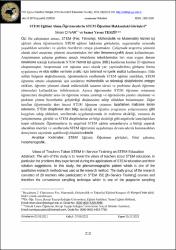| dc.contributor.author | Çınar, Sinan | |
| dc.contributor.author | Terzi, Samet Yavuz | |
| dc.date.accessioned | 2023-02-15T08:44:48Z | |
| dc.date.available | 2023-02-15T08:44:48Z | |
| dc.date.issued | 2021 | en_US |
| dc.identifier.citation | Çınar, S. & Terzi, S.Y. (2021). STEM Eğitimi Almış Öğretmenlerin STEM Öğretimi Hakkındaki Görüşleri. Van Yüzüncü Yıl Üniversitesi Eğitim Fakültesi Dergisi, 18(2), 213-245. https://doi.org/10.33711/yyuefd.1028596 | en_US |
| dc.identifier.issn | 1305-2020 | |
| dc.identifier.uri | https://doi.org/10.33711/yyuefd.1028596 | |
| dc.identifier.uri | https://hdl.handle.net/11436/7602 | |
| dc.description.abstract | Bu çalışmanın amacı, STEM (Fen, Teknoloji, Mühendislik ve Matematik) hizmet içi
eğitimi almış öğretmenlerin STEM eğitimi hakkında görüşlerini, uygulamalar sırasında
yaşadıkları sorunları ve çözüm önerilerini ortaya çıkarmaktır. Çalışmada araştırma yöntemi
olarak nitel araştırma yöntemi desenlerinden biri olan fenomenografik desen kullanılmıştır.
Araştırmanın çalışma grubunu amaçlı örnekleme tekniklerinden biri olan uygun durum
örnekleme tekniği kullanılarak STEM hizmet içi eğitim [HİE] kurslarına katılan 20 öğretmen
oluşturmuştur. Araştırmada veri toplama aracı olarak yarı yapılandırılmış görüşme formu
uygulanmış ve elde edilen verilerin analizi için betimsel ve içerik analizi kullanılmıştır. Elde
edilen bulgular doğrultusunda, öğretmenlerin sınıflarında STEM eğitimi yaptıkları, STEM
öğrenme ortamı oluşturmak için derslerine mühendislik ve teknoloji disiplinlerini entegre
ettikleri, öğretim yöntemi olarak mühendislik tasarım süreci ve probleme dayalı öğrenme
yöntemleri kullandıkları belirlenmiştir. Ayrıca öğretmenler STEM öğrenme ortamının
öğrencilere disiplinler arası bir öğrenme ortamı yarattığı ve öğrencilerin yaratıcı düşünme ve
problem çözme becerilerini geliştirdiği düşüncesine sahip oldukları bulunmuştur. Diğer
taraftan öğretmenler ders öncesi STEM öğrenme ortamını tasarlarken malzeme temin
edememe, STEM disiplinleri alan bilgi eksikliği ve öğretim programını yetiştirememe gibi
kaygılara sahip oldukları, sınıflarında uygulamalarında de malzeme eksikliği, zamanın da
yetiştirememe, gürültü ve STEM disiplinlerine ait bilgi eksikliği gibi engellerle karşılaştıkları
tespit edilmiştir. Öğretmenlerin bu engelleri STEM eğitim uzmanlarıyla iş birliği yaparak
alacakları öneriler ve sınıflarında STEM öğretimini uygulamaya devam ederek kazanacakları
deneyimler sayesinde aşabileceği düşünülmektedir. | en_US |
| dc.description.abstract | : The aim of this study is to reveal the views of teachers about STEM education, in
particular the problems they experienced during the applications of STEM education and their
solution suggestions. In this study, the phenomenographic pattern which is one of the
qualitative research methods was used as the research method. The study group of the research
consisted of 20 teachers who participated in STEM ISE [In-Service Training] courses and
therefore the convenience sampling technique which is one of the purposive sampling techniques was used. Data was collected using a semi-structured interview form and the
resulting data was performed by using descriptive and content analysis methods. It was
determined that teachers who received STEM ISE education teach STEM-focused teaching,
integrate engineering and technology disciplines into their lessons, particularly creating a
STEM-focused teaching environment, and using the engineering design process and problembased learning methods. In addition, the teachers argued that the STEM teaching environment
leads to an interdisciplinary learning environment for students and that both developed
students' creative thinking and improve problem-solving skills. On the other hand, the teachers
had various concerns, such as not being able to obtain materials, lack of knowledge on STEM
disciplines and not being able to train the curriculum while designing STEM education. While
applying STEM teaching in their classrooms, they face particular obstacles such as lack of
materials, inability to deliver on time, noise, and lack of knowledge in STEM disciplines. It is
assumed that teachers who had STEM ISE education would overcome such obstacles. Thanks
to the recommendations they would be acknowledged in cooperation with STEM education
experts and the experiences they would be gained by continuing to apply STEM education in
their classes. | en_US |
| dc.language.iso | tur | en_US |
| dc.publisher | Van Yüzüncü Yıl Üniversitesi | en_US |
| dc.rights | info:eu-repo/semantics/openAccess | en_US |
| dc.subject | STEM eğitimi | en_US |
| dc.subject | Öğretmen görüşleri | en_US |
| dc.subject | Nitel çalışma | en_US |
| dc.subject | Fenomenografik | en_US |
| dc.subject | STEM education | en_US |
| dc.subject | Teachers’ views | en_US |
| dc.subject | Qualitative research | en_US |
| dc.subject | Phenomenographic | en_US |
| dc.title | STEM eğitimi almış öğretmenlerin STEM öğretimi hakkındaki görüşleri | en_US |
| dc.title.alternative | Views of teachers taken STEM in-service training on STEM education | en_US |
| dc.type | article | en_US |
| dc.contributor.department | RTEÜ, Eğitim Fakültesi, Temel Eğitim Bölümü | en_US |
| dc.contributor.institutionauthor | Çınar, Sinan | |
| dc.contributor.institutionauthor | Terzi, Samet Yavuz | |
| dc.identifier.doi | 10.33711/yyuefd.1028596 | en_US |
| dc.identifier.volume | 18 | en_US |
| dc.identifier.issue | 2 | en_US |
| dc.identifier.startpage | 213 | en_US |
| dc.identifier.endpage | 245 | en_US |
| dc.relation.journal | Van Yüzüncü Yıl Üniversitesi Eğitim Fakültesi Dergisi | en_US |
| dc.relation.publicationcategory | Makale - Uluslararası Hakemli Dergi - Kurum Öğretim Elemanı | en_US |


















